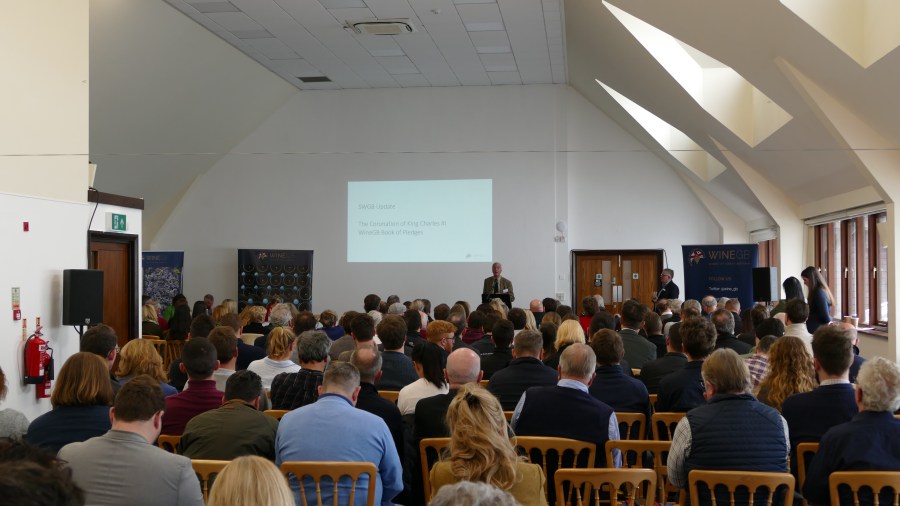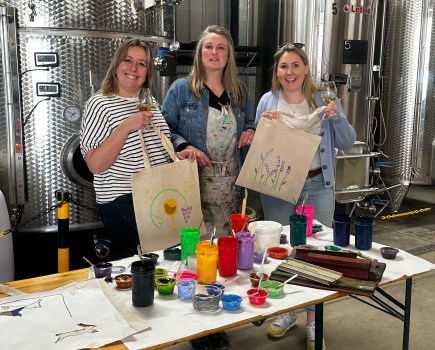The WineGB Industry conference this year took place on 6 March at Denbies Wine Estate, Dorking Surrey.
The sold out event saw visitors treated to a plethora of speakers covering numerous topics and the beautiful drive up to Denbies Wine Estate with vines on either side certainly ensured that visitors arrived in the right frame of mind.
Delegates heard Jancis Robinson MW open the conference and her first act was to thank all in attendance “for together creating a brilliant wine industry that Brits can be so proud of.” With progress comes challenges and trends “the most depressing trend in global terms is the contraction of the wine market,’ said Jancis. “There are so many alternatives: cocktails, draught beer, gin…downward pressure on the wine market and it is as well to be aware of that,” she added. It was clear however that even on this point the news is not all negative “less but better” and “buy local, eat local” provide positive selling points for UK wine. On another positive note about general trends “oak down, alcohol and intense colour down, acid and freshness up are all things that play into your hand,” she told the audience. Pet Nat wines were also singled out as a market that is popular among young wine drinkers.
Speaking more specifically Jancis Robinson advised wine businesses to engage with the consumer – the real stories are important. Jancis advised: “There is a communication job to get across to the average consumer why your wine costs what it does.” Wine tourism and education as a way to increase direct to consumer sales “which are so much more profitable” was also highlighted in this introduction to a packed programme.
“We cannot avoid climate change,” said Jancis. “So far our country has been one of its beneficiaries but how long is that going to go on?” she asked. Using examples from the extraordinary weather events in both 2022 and 2023 from all over the world: Burgundy, Champagne and Hawkes Bay highlighting the impact of climate change. Pointing out that we are “in survival mode” there is a move towards sustainability and biodiversity within regenerative agriculture.
Dr Greg Cielniak from the University of Lincoln was the next speaker to take to the podium and he provided fascinating insights into practical applications of robotic technology. He predicted that this technology will be seen in viticulture within the decade. Dr Cielniak pointed out that so far his team has been working with vineyards in Europe and the WineGB Industry conference would be an opportunity for him to engage with the UK wine industry. “The British wine industry is a great place to collaborate on things like this,” he said. Introducing the team at the University of Lincoln Dr Cielniak explained that there are currently 30 staff working within the robotics for agriculture field with applications such as selective harvesting, phenotyping, navigation and safety. Dr Cielniak pointed to the change in the perception of automation. “The narrative around robots has changed in the last five years… now it is a signal of promise or hope to save the industry, not to take jobs but to save businesses.” Speaking of a current project Dr Cielniak spoke about the development of technology that would allow for selective harvesting that would ensure only perfectly ripe grapes are picked. After being invited to ask questions one member of the audience took the opportunity to thank Dr Cielniak for “years of research distilled into a few slides that we can look at.”
Simon Thorpe MW presented the next segment outlining what will be a very busy 12 month period for WineGB.
Simon outlined how data at the moment relies on collecting a significant amount of information from growers. There will be a report released later in the year that will “explain to the government how important we are now and how increasingly important we will be in the next decade,” he said. Viticulture is such a growing industry “we need to be able to show what it looks like as it grows,” Simon added. There was also a request for any growers who have received an industry survey to send in their response.
On the growth of the industry Simon showed figures from the Food Standards data (which is probably missing a significant number of vineyards due to a delay in registration) that shows there are about 4,000 hectares of vines in the UK which has more than doubled since 2015. One surprising figure was that since 2020 there have been 60 new vineyards planted by new entrants to the industry. Another interesting graphic highlighted that hybrid varieties now make up 10% of grape varieties planted in the UK. Looking to the future the projections suggest that by 2032 there will be 26 million bottles being produced in England and Wales.
WineGB received about 121 responses to the industry consultation on PGI/PDO and these replies had a high degree of consensus. The topic of still wines will be revisited later in 2023 and there will also be some thought given specifically to wine in Wales. Points that came from the consultation relating to the production of sparkling wines started with that idea that there should be no difference in the meaning of the terms England/English and likewise with the terms Wales/Welsh. Another clear outcome from the consultation was that the term British should not include wines made from concentrate that is bought in from other countries. Currently you can only be in the PDO/PGI scheme for sparkling wine if you make wine in the traditional method but the consultation surprisingly highlighted a strong consensus that all sparkling wine that is made here should be allowed within the scheme.
“The world is changing and we have a growing category of sparkling wines made from other production methods and we shouldn’t deny them access to the PDO/PGI schemes but it was clear also that we should protect traditional method sparkling wines separately from the rest. These wines should continue to have some differentiation.” Simon explained another commonly held view was that permitted grape vine varieties within the overall scheme should be broadened to allow more of the hybrids to come in, as they are varieties that will help the industry become more sustainable so they should be included. The next consultation will be related to how the differentiation among sparkling wines can be achieved and this investigation will start shortly. “We really want to give everybody the chance to have their say,” Simon concluded.
Simon Thorpe announced that there was a change of personnel at the Sustainable Wines of Great Britain Scheme. Chris Foss who has worked very hard to get the scheme up and running is no longer working with the SWGB scheme. To ensure that sustainability continues as the focus of the scheme Peter Gladwin has agreed to chair a review of the SWGB scheme which will be undertaken by a review panel.
Simon Thorpe also announced the development of a book with contributions from members that will be presented to King Charles III in his coronation year. Simon Thorpe added a plea for vineyards and winemakers to get involved with this project.
Simon Thorpe then handed over to Julia Trustram Eve who presented the results and findings of the WineGB tourism survey. The survey was sent to 215 businesses who provide tourism in some form. “We received 85 responses, I am reliably informed that 85 from 215 is a pretty good result so again thank you very much to those who took part,” said Julia. By 79% of respondents wine tourism was ranked as important or very important.
From the data it was clear that for the smaller producers wine tourism has a huge impact on their income. Most of the respondents expected their tourism offering to increase in the near future. “Nearly 50% of respondents stated that they had a venue to hold weddings and other events and just over 20% have accommodation, with a large number expecting to add accommodation,” Julia explained.
There was good news with actual visitor numbers recovering well after the pandemic. A large number of respondents (2/3) reported a 17% increase in visitor numbers in 2022 compared to the previous year and just short of 970,000 visitors were recorded among only 68 respondents. One very interesting statistic from Visit Britain found 42% of inbound tourists that responded to the survey declared they would be interested in visiting a vineyard in the UK. “We asked what support do you want from WineGB? One common response was the suggestion of the production of more leaflets and maps,” said Julia.
On the subject of support from national and local government agencies unsurprisingly the subjects of wine cellar door duty relief, planning permission and signage were high on the list. Julia pointed out that Mardi Roberts who has had a huge amount of experience in the south east tourism sector sits on an advisory board at Visit Britain and Ruth Simpson sits on the Board of visit Britain so there are people working very hard behind the scenes to promote wine tourism. Julia also spoke about the huge amount of online conversation that is generated around English Wine Week reminding attendees of the importance of creating a buzz around events that will be held. It was exciting to hear about the development of an awards programme to highlight cellar door excellence involving judging panels and secret shoppers. The scheme will involve both large and small enterprises and is currently planned for rollout in 2024.
The final seminar of the morning session was presented by Tamara Roberts of Ridgeview with the title Managing Workload to Support Diversity in the UK Wine Industry. The afternoon provided the perfect opportunity for delegates to choose which area of interest they wished to explore with multiple lectures available under the headings Viticulture, Winemaking and Business & Marketing.
At the viticulture seminars sustainable practices and their link to fruit quality was the subject discussed by Peter Hayes after which Luke Boxall spoke on the subject Sustainable Viticulture: Soil Health. Gregg Dunn was the final speaker of the day in this section. Over in the Winemaking session Winemakers Sam Lindo and Nick Lane presented A New Way to Make Pinot Noir. This was followed by a very in depth look at How Microbes Affect Wine Style with Professor Matthew Goddard of the University of Lincoln.
The presentation was crammed with thought provoking material relating to the microbes and their impact on wine. “Microbes play a small but measurable role in wines sense of place,” said Professor Goddard. Meanwhile Henry Clemons of Knight Frank, under the heading of Business & Marketing, spoke on the subject of Grant Funding for the UK Wine Sector. Something that all who are eligible should consider. This was followed by Hannah Milnes whose topic of Social Media: Making the Most of your Digital Presence had been a consistent theme throughout the morning and many of those in attendance will no doubt benefit from this timely discourse.
A fantastic conference was concluded with an opportunity for those in attendance to mingle and continue to learn from each other and share an interchange of ideas our appreciation of this heightened by its absence in recent years.
For more like this, sign up for the FREE Vineyard newsletter here and receive all the latest viticulture news, reviews and insight




